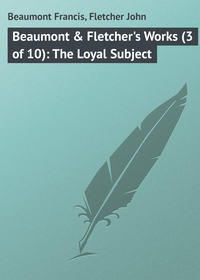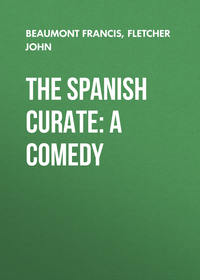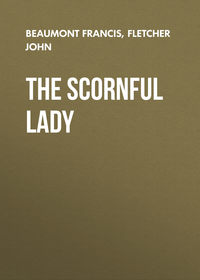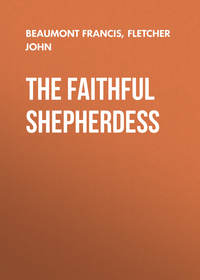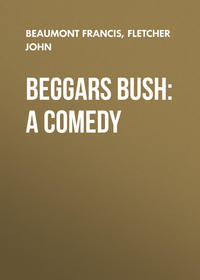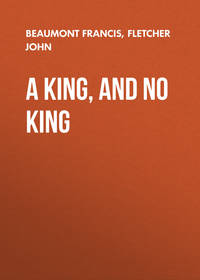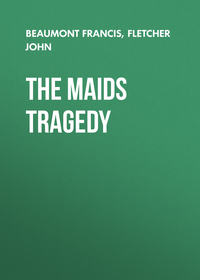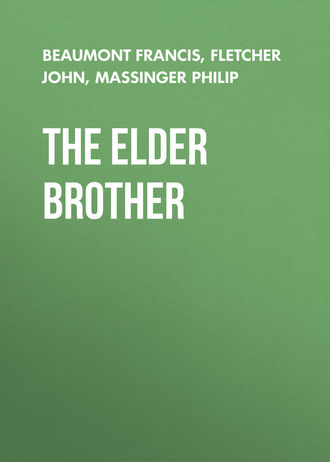
The Elder Brother
p. 58, l. 6. but is an Amadis. l. 8. effect it. l. 9. kind of consent. l. 14. Andrew have his farme increasd. l. 15. and rut no. l. 17. the Billmen.
The MS. gives the Epilogue but not the Prologue.
It also adds the following verses:—Epigram:
A freemans life is like a pilgrimageWhats his life then that lives in mariageTis Sisiphus his toyle that with a stoneDoth doe what surely for ease must be doneHis laboures Journey's endles, tis no RiddleSince he's but halfe on's way that stands in th'middle.Ad Janum.
Take Comfort Janus, never feare thy headWhich to the quick belongs, not to the deadThy wife did lye with one, thou being dead drunkeThou art no Cuckold though shee bee a Punke.Tis not the state nor soveraintie of Jove could draw thy pure affections from my love nor is there any Venus in the Skyes could from thy looks with draw my greedy eyes.
THE SPANISH CURATE
A = First Folio; B = Second Folio.
p. 60, ll. 3-41. Omitted in A. l. 42. A omits] and. l. 46. A] heirs.
p. 61, l. 38. A] Encreasing by. l. 39. B misprints] Vialante.
p. 63, l. 17. A] base and abject.
p. 64, l. 2. A] Or modestie. l. 18. B misprints whow. l. 31. A] wish that it.
p. 65, l. 17. A] By this example. l. 25. A] or of my.
p. 66, l. 8. A] of mine own. l. 26. A] Mirth, and Seck.
p. 68, l. 2. A] have you.
p. 70, l. 28. A] provoking it call.
p. 73, l. 13. A] To me, of, that misery against my will.
p. 74, l. 33. A] A omits] as.
p. 75, l. 18. A] A gives this line to Lean. l. 31. A adds] exit lea. and gives ll. 32 and 33 to Ars. l. 34. A omits] Exeunt Mil. Ars.
p. 76, l. 29. A] A comma has been substituted for a full-stop after weathers.
p. 77, l. 25. A] look out it. l. 39. A] has.
p. 79, l. 3. A] often-times. l. 15. B prints] Dig. l. 28. A omits] to. ll. 33 and 34. A gives these lines to Lea.
p. 80, l. 22. B misprints] yesterday.
p. 82, l. 9. A] still and the l. 16. A] jealousies.
p. 83, l. 3. B] More.
p. 84, l. 15. A] Gentleman.
p. 86, l. 8. A] be a kin. l. 10. A] 'long.
p. 87, l. 19. A] am both to l. 23. A] 'Faith.
p. 88, l. 6. A] Y'faith. l. 26. A] ye might.
p. 89, l. 4. A adds] Enter Amaranta. l. 18. B misprints] womau. ll. 21-34. Omitted in A.
p. 90, l. 22. A] lock upon me.
p. 92, l. 25. A adds stage direction] Two chaires set out. l. 28. A omits] are.
p. 93, l. 10. A] porrage l. 23. A] gymitrie.
APPENDIX
THE ELDER BROTHER IN VERSE, FROM THE QUARTO OF 1637 (A)
Actus I. Scena I
Lewis, Angellina, Sylvia.
Nay, I must walk you farther. Ang. I am tyr'd Sir,And nere shall foot it home. L. 'Tis for your health;The want of exercise takes from your beauties,And sloath dries up your sweetness: That you areMy onely Daughter and my heir, is granted;And you in thankfulness must needs acknowledge,You ever finde me an indulgent Father,And open-handed. Ang. Nor can you tax me, Sir,I hope, for want of duty to deserveThese favours from you. Lew. No, my Angellina,I love and cherish thy obedience to me,Which my care to advance thee, shall confirm:All that I aime at, is to winne thee fromThe practise of an idle foolish stateUs'd by great Women, who think any labour(Though in the service of themselves) a blemishTo their faire fortunes. Ang. Make me understand Sir,What 'tis you point at. Lew. At the custome howVirgins of wealthy families, waste their youth;After a long sleep when you wake, your womanPresents your breakfast, then you sleep again,Then rise, and being trimm'd up by others hands,Y'are led to dinner, and that ended, eitherTo Cards or to your Couch (as if you wereBorn without motion) After this to Supper,And then to bed; And so your life runnes roundWithout variety or action Daughter.Syl. Here's a learned Lecture! Lew. From this idlenesseDiseases both in body and in mindeGrow strong upon you; where a stirring natureWith wholesome exercise guards both from danger:I'de have thee rise with the Sunne, walke, dance or hunt,Visite the groves and springs, and learne the vertueOf Plants and Simples: Doe this moderately,And thou shall not with eating chalke, or coales,Leather and oatmeale, and such other trash,Fall into the greene sicknesse. Syl. With your pardon(Were you but pleas'd to minister it) I couldPrescribe a remedy for my Ladies health,And her delight too, farre transcending thoseYour Lordship but now mention'd. Lew. What is it Sylvia?Syl. What i'st? A noble Husband; In that word, aNoble Husband, all content of WomanIs wholly comprehended; He will rowse her,As you say, with the Sunne, and so pipe to her,As she will dance, ne're doubt it, and hunt with her,Upon occasion, untill both be weary;And then the knowledge of your Plants and Simples,As I take it, were superfluous; A loving,And but adde to it a gamesome Bedfellow,Being the sure Physician. Lew. Well said Wench.Ang. And who gave you Commission to deliverYour verdict, Minion? Syl. I deserve a fee,And not a frown, deare Madam; I but speakHer thoughts, my Lord, and what her modestyRefuses to give voyce to; shew no mercyTo a Maidenhead of fourteene, but off with't:Let her lose no time Sir; fathers that denyTheir Daughters lawfull pleasure, when ripe for them,In some kinds edge their appetites to tast ofThe fruit that is forbidden. Lew. Tis well urg'd,And I approve it; no more blushing Girle,Thy woman hath spoke truth, and so preventedWhat I meant to move to thee: There dwells neere usA Gentleman of blood, Mounsieur Brisac,Of a faire state, sixe thousand Crowns per annum,The happy Father of two hopefull Sons,Of different breeding; Th' elder, a meere Scholar,The younger, a quaint Courtier. Ang. Sir, I know themBy publique fame, though yet I never saw them;And that oppos'd antipathy betweenTheir various dispositions, renders themThe general discourse and argument;One part inclining to the Scholar Charles,The other side preferring Eustace, asA man compleat in Courtship. Lew. And which [w]ay(If of these two you were to chuse a husband)Doth your affection sway you? Ang. to be plaine, Sir,(Since you will teach me boldnesse) as they areSimply themselves, to neither; Let a CourtierBe never so exact, Let him be blest withAll parts that yeeld him to a Virgin gracious,If he depend on others, and stand notOn his owne bottomes, though he have the meanesTo bring his Mistresse to a Masque, or byConveyance from some great ones lips, to tasteSuch favour from the Kings: or grant he purchase,Precedency in the Country, to be sworneA servant Extraordinary to the Queen;Nay, though he live in expectation ofSome huge preferment in reversion; IfHe Want a present fortune, at the bestThose are but glorious dreames, and onely yeeld himA happiness in posse, not in esse;Nor can they fetch him silkes from th' Mercer; norDischarge a Taylors bill; nor in full plenty(Which still preserves a quiet bed at home)Maintaine a family. Lew. Aptly consider'd,And to my wish; but what's thy censure ofThe Schollar? Ang. Troth (if he be nothing else)As of the Courtier; all his Songs, and Sonnets,His Anagrams, Acrosticks, Epigrammes,His deep and Philosophical discourseOf natures hidden secrets, makes not upA perfect husband; He can hardly borrowThe Starres of the Celestial crown to make meA tire for my head; nor Charles Waine for a Coach,Nor Ganymede for a Page, nor a rich GowneFrom Juno's Wardrob, nor would I lye in(For I despaire not once to be a mother)Under heavens spangled Canopy, or banquetMy guests and Gossips with imagin'd Nectar;Pure Orleans would doe better; no, no, father,Though I could be well pleas'd to have my husbandA Courtier, and a Schollar, young, and valiant,These are but gawdy nothings, if there be notSomething to make a substance. Lew. And what is that?Ang. A full estate, and that said, I've said all, And get me such a one with these additions, Farewell Virginity, and welcome wedlock.
Lew. But where is such one to be met with Daughter?A black Swan is more common, you may weareGrey tresses ere we find him. Ang. I am notSo punctual in all ceremonies, I will bateTwo or three of these good parts, before Ile dwellToo long upon the choice. Syl. Onely, my Lord, rememberThat he be rich and active, for without theseThe others yeeld no relish, but these perfect;You must bear with small faults, Madam. Lew. Merry Wench,And it becomes you well; Ile to Brisac,And try what may be done; ith' mean time, home,And feast thy thoughts with th' pleasures of a Bride.Syl. Thoughts are but airy food Sir, let her tast them.
Actus I. Scena II
Andrew, Cooke, Butler.
Unload part of the Library, and make roome
For th' other dozen of Carts, Ile straight be with you.
Co. Why hath he more bookes? And. More than ten Marts send over.But. And can he tell their names? And. their names? he has 'emAs perfect as his pater noster, but that's nothing,'Has red them over leaf by leaf three thousand times;But here's the wonder, though their weight would sinkA Spanish Carrack, without other ballast,He carryeth them all in his head, and yetHe walkes upright. But. Surely he has a strong braine.And. If all thy pipes of wine were fill'd with bookesMade of the barkes of trees, or mysteries writIn old moth-eaten vellam, he would sip thy CellerQuite dry, and still be thirsty; Then for's Diet,He eats and digests more Volumes at a meal,Than there would be Larkes (though the sky should fall)Devowred in a moneth in Paris, yet feare notSons oth' buttry, and kitchin, though his learn'd stomackCannot b' appeas'd; Hee'll seldom trouble you,His knowing stomack contemnes your blacke Jacks, Butler,And your Flagons; and Cook thy boyl'd, thy roast, thy bak'd.Co. How liveth he? And. Not as other men doe,Few Princes fare like him; He breakes his fastWith Aristotle, dines with Tully, takesHis watering with the Muses, sups with Livie,Then walkes a turne or two in via lactea,And (after six houres conference with the starres)Sleepes with old Erra Pater. But. This is admirable.And. I'le tell you more hereafter, here's my old Master And another old ignorant Elder, Ile upon 'em.
Enter Brisac, Lewis.
What Andrew? welcome, where's my Charles! speake Andrew,Where didst thou leave thy Master? And. ContemplatingThe number of the sands in the high way,And from that, purposes to make a judgementOf the remainder in the Sea; He is Sir,In serious study, and will lose no minute,Nor out of 's pace to knowledge. Lew. This is strange.And. Yet he hath sent his duty Sir before himIn this fair manuscript. Bri. What have we here?Pot-hookes and Andirons! And. I much pitie you,It is the Syrian Character, or the Arabicke,Would 'ee have it said, so great and deep a ScholarAs Master Charles is, should ask blessingIn any Christian Language? Were it Greeke,I could interpret for you, but indeedI'm gone no farther. Bri. And in Greeke, you canLie with your smug wife Lilly. And. If I keepe herFrom your French dialect, as I hope I shall Sir,Howere she is your Laundresse, she shall put youTo th' charge of no more soape than usuallFor th' washing of your sheets. Bri. Take in the knave,And let him eat. And. And drink too Sir. Bri. And drinke too Sir,And see your Masters Chamber ready for him.But. Come Doctor Andrew without Disputation Thou shall commence ith' Celler. And. I had rather Commence on a cold bak'd meat. Co. Thou shall ha't, Boy. Ex.
Bri. Good Mounsieur Lewis, I esteeme my selfeMuch honour'd in your cleare intent, to joyneOur ancient families, and make them one,And 'twill take from my age and cares to liveAnd see what you have purpos'd but in act,Of which your visite at this present isA hopeful Omen; I each minute expectingTh' arrival of my Sons; I have not wrong'dTheir Birth for want of meanes and education,To shape them to that course each was addicted;And therefore that we may proceed discreetly,Since what's concluded rashly seldome prospers,You first shall take a strict perusal of them,And then from your allowance, your fair daughterMay fashion her affection. Lew. Monsieur Brisac,You offer fair, and nobly, and Ile meet youIn the same line of honour, and I hope,Being blest but with one daughter, I shall notAppeare impertinently curious,Though with my utmost vigilance and study,I labour to bestow her to her worth;Let others speak her forme, and future fortuneFrom me descending to her; I in thatSit down with silenc[e]. Bri. You may my Lord securely,Since fame alowd proclaimeth her perfections,Commanding all mens tongues to sing her praises;Should I say more, you well might censure me(What yet I never was) a Flatterer.What trampling's that without of Horses?Enter Butler.
Sir my young Masters are newly alighted.
Bri. Sir now observe their several dispositions.
Enter Charles.
Bid my Subsiser carry my Hackney to buttry,And give him his bever; it is a civilAnd sober beast, and will drink moderately,And that done, turne him into the quadrangle.Bri. He cannot out of his University tone.
Enter Eustace, Egremont, Cowsy.
Lackey, Take care our Coursers be well rubb'd,And cloath'd, they have out stripp'd the wind in speed.Lew. I marry Sir, there's metal in this young fellow! What a sheeps look his elder brother has!
Char. Your blessing, Sir? Bri. Rise Charles, thou hast it.
Eust. Sir, though it be unusual in the Court,(Since 'tis the Courtiers garbe) I bend my knee,And do expect what followes. Bri. Courtly begg'd.My blessing! take it. Eust. Your Lordships vow'd adorer: to Lew.What a thing this brother is! yet Ile vouchsafe himThe new Italian shrug— How clownishlyThe book-worme does return it! Ch. I'm glad y'are well; reads.Eust. Pray you be happy in the knowledge of This paire of accomplish't Mounsieurs. They are Gallants that have seen both Tropicks.
Br. I embrace their love. Egr. which wee'l repay with servulating.
Cow. And will report your bounty in the Court.
Bri. I pray you make deserving use on't first: Eustace, give entertainment to your friends, What's in my house is theirs. Eust. Which wee'l make use of; Let's warme our braines with half a dozen healths, And then hang cold discourse, for wee'll speak fire-workes. Exe.
Lew. What at his book already? Bri. Fy, Fy, Charles,No hour of interruption? Cha. Plato differsFrom Socrates in this. Bri. Come lay them by;Let them agree at leasure. Cha. Mans life Sir, beingSo short, and then the way that leades untoThe knowledg of our selves, so long and tedious,Each minute should be precious. Bri. In our careTo manage worldly business, you must part withThis bookish contemplation, and prepareYour self for action; to thrive in this age,Is held the blame of learning; you must studyTo know what part of my land's good for th' plough,And what for pasture; how to buy and sellTo the best advantage; how to cure my OxenWhen they're oregrown with labour. Cha. I may do thisFrom what I've read Sir; for what concerns tillage?Who better can deliver it than VirgilIn his Georgicks? and to cure your herds,His Bucolicks is a masterpeece; but whenHe does discribe the Commonwealth of Bees,Their industry and knowledge of the herbs,From which they gather honey, with their careTo place it with decorum in the Hive,Their gover[n]ment among themselves, their orderIn going forth and comming loaden home,Their obedience to their King, and his rewardsTo such as labour, with his punishmentsOnely inflicted on the slothful Drone,I'm ravished with it, and there reap my harvest,And there receive the gaine my Cattle bring me,And there find wax and honey. Bri. And grow richIn your imagination; heyday heyday,Georgicks, Bucolicks, and Bees! Art mad?Cha. No Sir, the knowledge of these guards me from it.
Bri. But can you find among your bundle of bookes(And put in all your Dictionaries that speak all tongu's)What pleasure they enjoy, that do embraceA well shap'd wealthy Bride? Answer me that.Cha. Tis frequent Sir in story, there I read ofAll kinde of vertuous and vitious women;The ancient Spartan Dames, and Roman Ladyes,Their beauties and deformities, and whenI light upon a Portia or Cornelia,Crown'd with still-flourishing leaves of truth and goodness,With such a feeling I peruse their fortunes,As if I then had liv'd, and freely tastedTheir ravishing sweetness; at the present lovingThe whole sexe for their goodness and example.But on the contrary when I looke onA Clytemnestra, or a Tullia;The first bath'd in her husbands blood; The latter,Without a touch of piety, driving onHer Chariot ore her fathers breathless trunk,Horrour invades my faculties; and comparingThe multitudes o' th' guilty, with the fewThat did dye Innocents, I detest, and loathe 'mAs ignorance or Atheisme. Bri. You resolve thenNere to make payment of the debt you owe me.Cha. What debt, good Sir? Bri. A debt I payd my fatherWhen I begat thee, and made him a Grandsir,Which I expect from you. Cha. The children Sir,Which I will leave to all posterity,Begot and brought up by my painefull studies,Shall be my living issue. Bri. Very well.And I shall have a general collectionOf all the quiddits from Adam to this timeTo be my Grandchild. Ch. And such a one I hope SirAs shall not shame the family. Bri. Nor will youTake care of my estate? Cha. But in my wishes;For know Sir, that the wings on which my SoulIs mounted, have long since born her too highTo stoope to any prey that scares not upwards.Sordid and dunghil minds compos'd of earth,In that grosse Element fix all their happiness;But purer spirits, purg'd and refin'd, shake offThat clog of humane frailtie; give me leaveT'injoy my selfe; that place that does containeMy Bookes (the best Companions) is to meA glorious Court, where hourely I converseWith the old Sages and Philosophers,And sometimes for variety, I conferreWith Kings and Emperours, and weigh their Counsels,Calling their Victories (if unjustly got)Unto a strict accompt, and in my phancy,Deface their ill-plac'd Statues; Can I thenPart with such constant pleasures, to embraceUncertaine vanities? No, be it your careT'augment your heap of wealth; It shall be mineT'encrease in knowledg—Lights there for my study. Exit.Bri. Was ever man that had reason thus transported From all sense and feeling of his proper good? It vexes me, and if I found not comfort In my young Eustace, I might well conclude My name were at a period! Lew. Hee's indeed Sir The surer base to build on. Bri. Eustace. Eust. Sir. [_Ent. Eust. Egre. Cow. & Andr.
Bri. Your eare in private. And. I suspect my masterHas found harsh welcome, he's gon supperlessInto his study; could I find out the cause,It may be borrowing of his books, or so,I shall be satisfi'd. Eust. My duty shall Sir,Take any forme you please; and in your motionTo have me married, you cut off all dangersThe violent heats of youth might beare me to.Lew. It is well answer'd. Eust. Nor shall you my LordFor your faire Daughter ever finde just causeTo mourn your choice of me; the name of husband,Nor the authority it carries in itShall ever teach me to forget to beAs I am now her servant, and your Lordships;And but that modesty forbids, that IShould sound the Trump of my owne deserts,I could say my choice manners have been such,As render me lov'd and remarkableTo th' Princes of the blood. Cow. Nay to the King.Egre. Nay to the King and Councel. And. These are Court admirers, And ever eccho him that beares the bagg. Though I be dull-ey'd, I see through this jugling.
Eust. Then for my hopes: Cow. Nay certainties. Eust. They standAs faire as any mans. What can there fallIn compass of her wishes which she shall notBe suddenly possess'd of? Loves she titles?By th' grace and favour of my princely friends,I am what she would have me. Bri. He speakes well,And I beleeve him. Lew. I could wish I did so.Pray you a word Sir. He's a proper Gentleman,And promises nothing, but what is possible.So far I will go with you; Nay I add,He hath won much upon me, and were heBut one thing that his brother is, the bargainWere soone struck up. Bri. What's that my Lord? Lew. the heire.And. Which he is not, and I trust never shall be.
Bri. Come, that shall breed no difference; you see Charles has giv'n ore the World; Ile undertake, And with much ease, to buy his birthright of him For a dry-fat of new bookes; nor shall my state Alone make way for him, but my-elder brothers, Who being issueless, t'advance our name, I doubt not will add his; Your resolution?
Lew. He first acquaint my daughter with the proceedings,On these terms I am yours, as she shall be,Make you no scruple, get the writings ready,She shall be tractable; to-morrow we will holdA second conference: Farewell noble Eustace,And you brave Gallants. Eust. Ful increase of honourWait ever on you[r] Lordship. And. The Gowt ratherAnd a perpetual Meagrim. Bri. You see Eustace,How I travail to possess you of a fortuneYou were not born to; be you worthy of it,Ile furnish you for a Suitor; visit herAnd prosper in't. Eust. Shee's mine Sir, fear it not:In all my travailes, I nere met a VirginThat could resist my Courtship. Eust. If take now,Ware made for ever, and will revel it. Exeunt.And. In tough Welsh parsly, which in our vulgar TongueIs strong hempen halters; My poore Master coo'znd,And I a looker on! If we have studiedOur majors, and our minors, antecedents,And consequents, to be concluded coxcombes,W have made a faire hand on't; I am glad I h've foundOut all their plots, and their conspiracies;This shall t' old Mounsieur Miramont, one, that thoughHe cannot read a Proclamation, yetDotes on learning, and loves my Master CharlesFor being a Schollar; I hear hee's comming hither,I shall meet him, and if he be that oldRough teasty blade he always us'd to be,I'le ring him such a peale as shall go neereTo shake their belroome, peradventure, beat 'm,For he is fire and flaxe, and so have at him. Exit.Finis Actus primiActus 2. Scena I
Miramont, Brisac.
Nay Brother, brother. Bri. Pray Sir be not moved,I meddle in no business but mine own,And in mine owne 'tis reason I should governe.Mir. But how to govern then, and understand Sir,And be as wise as y'are hasty, though you beMy brother, and from one bloud sprung, I must tell yeeHeartily and home too. Br. What Sir? Mir. What I grieve to findYou are a foole, and an old foole, and that's two.Bri. We'l part 'em, if you please. Mir. No they're entailed to 'em.Seeke to deprive an honest noble spirit,Your eldest Son Sir? and your very Image,(But he's so like you that he fares the worse for't)Because he loves his booke and doates on that,And onely studies how to know things excellent,Above the reach of such course braines as yours,Such muddy fancies, that never will know fartherThen when to cut your Vines, and cozen Merchants,And choake your hide-bound Tenants with musty harvests.Bri. You go to fast. Mir. I'm not come too my pace yet;Because h' has made his studie all his pleasure,And is retyr'd into his Contemplation,Not medling with the dirt and chaffe of nature,That makes the spirit of the mind mud too,Therefore must he be flung from his inheritance?Must he be dispossess'd, and Mounsieur Gingle boyHis younger brother— Bri. You forget your self.Mir. Because h' has been at Court and learn'd new tongues,And how to speak a tedious peece of nothing;To vary his face as Seamen do their Compass,To worship images of gold and silver,And fall before the she Calves of the Season,Therefore must he jump into his brothers land?Bri. Have you done yet, and have you spake enough, In praise of learning, Sir? Mir. Never enough.


